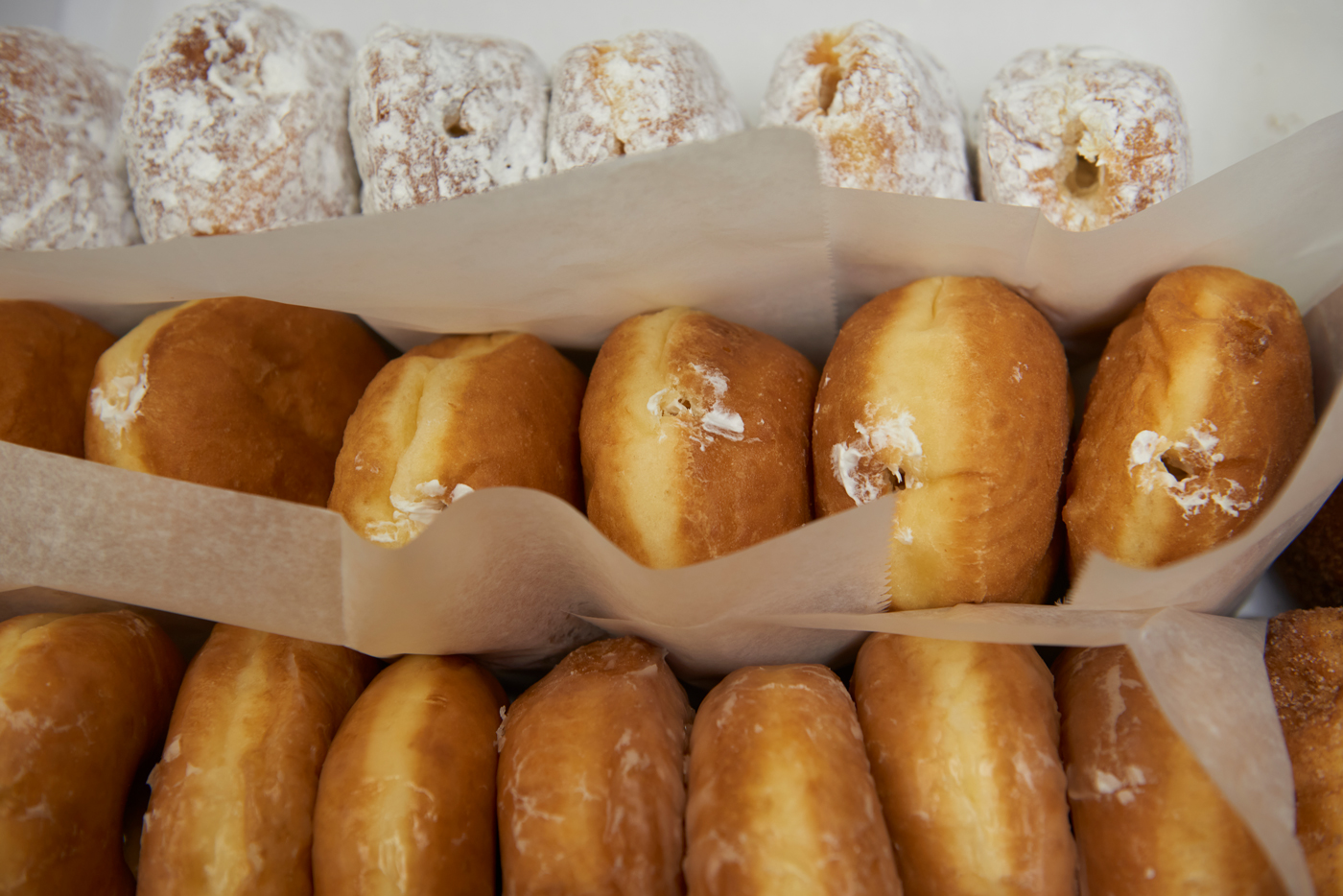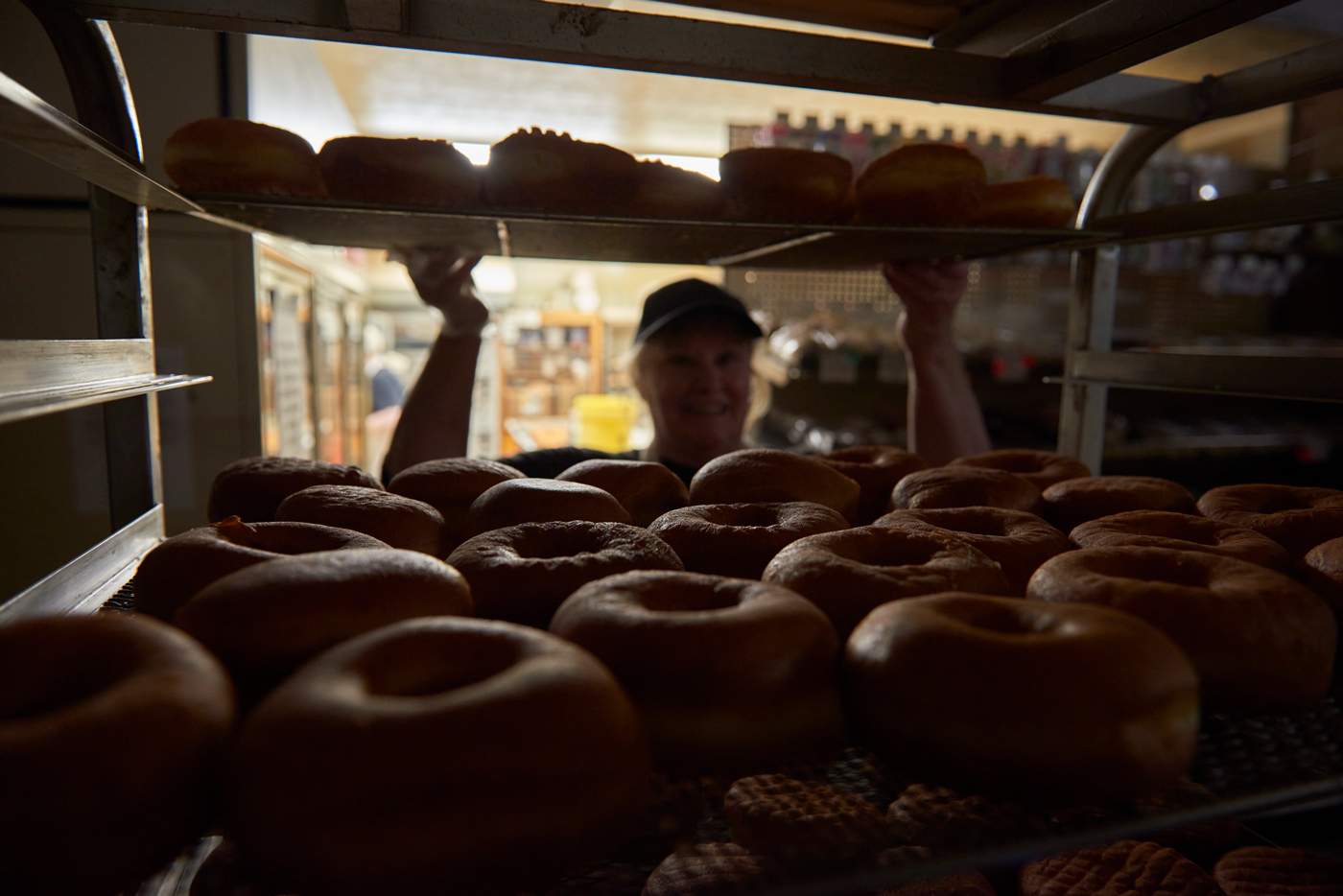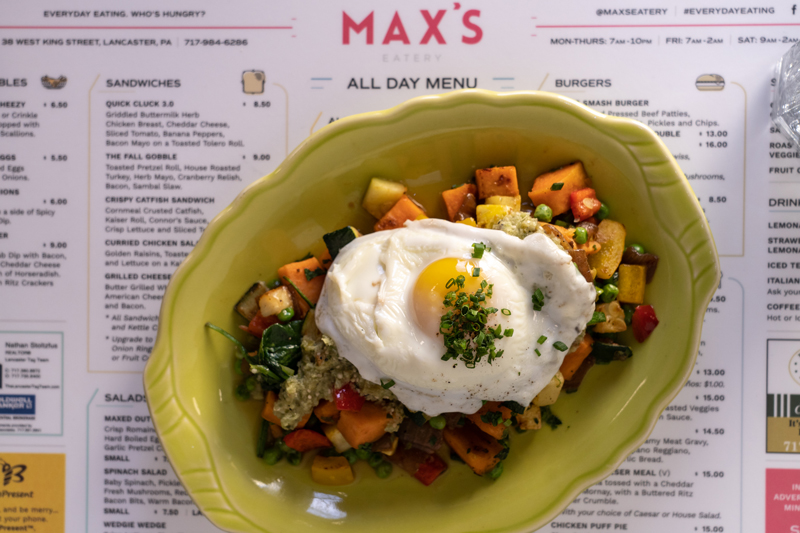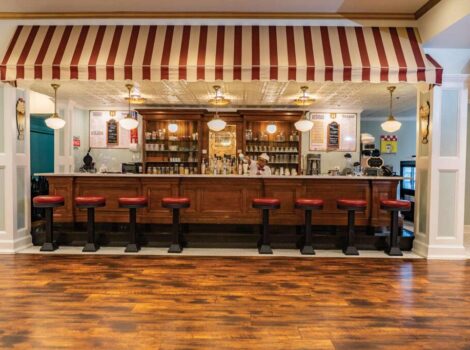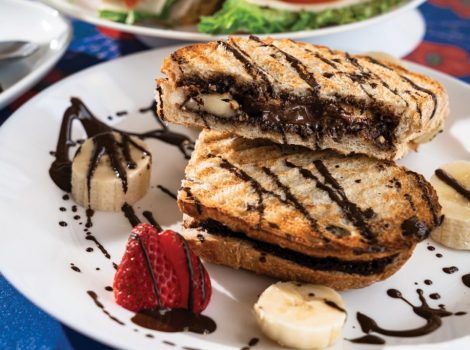Donut Delights From Weiser’s Market
Originally published in the July 2021 issue of Lancaster County Magazine.
A few years ago on a summer evening, our neighbors brought us some donuts left over from a party. I sampled a Boston cream-filled donut and it was fantastic! The ample portion of cream-filled goodness was beyond comprehension! Soon, the only evidence that remained was powdered sugar that covered us like a blanket of fresh snow. I had to know where these donuts came from and what makes them so delicious.
The answer was Weiser’s Market, and having moved to the Akron area five years ago, I’m ashamed to admit it took a while for Weiser’s to catch my eye. Located on Main Street near the offices of Ten Thousand Villages and a stone’s throw from Route 272, Weiser’s is a not-so-hidden gem that’s been known and loved by Akron-area residents for the last 23 years. With compounding humility, I’ll confess that I’d driven by countless times over that period, assuming the market was “just” a convenience store. Upon tasting that donut, I made it my mission to learn what makes Weiser’s a staple in the local community and to sample my very favorite on the confection scale – a cream-filled donut. The donut did not disappoint – in fact, it proved to be the best cream-filled donut of my life!
Bake All Night
When I inquired about the possibility of devoting one of my columns to their donuts, Weiser’s invited me to document the process from start to finish. That meant I’d be pulling an all-nighter and, being a night owl, I was game.
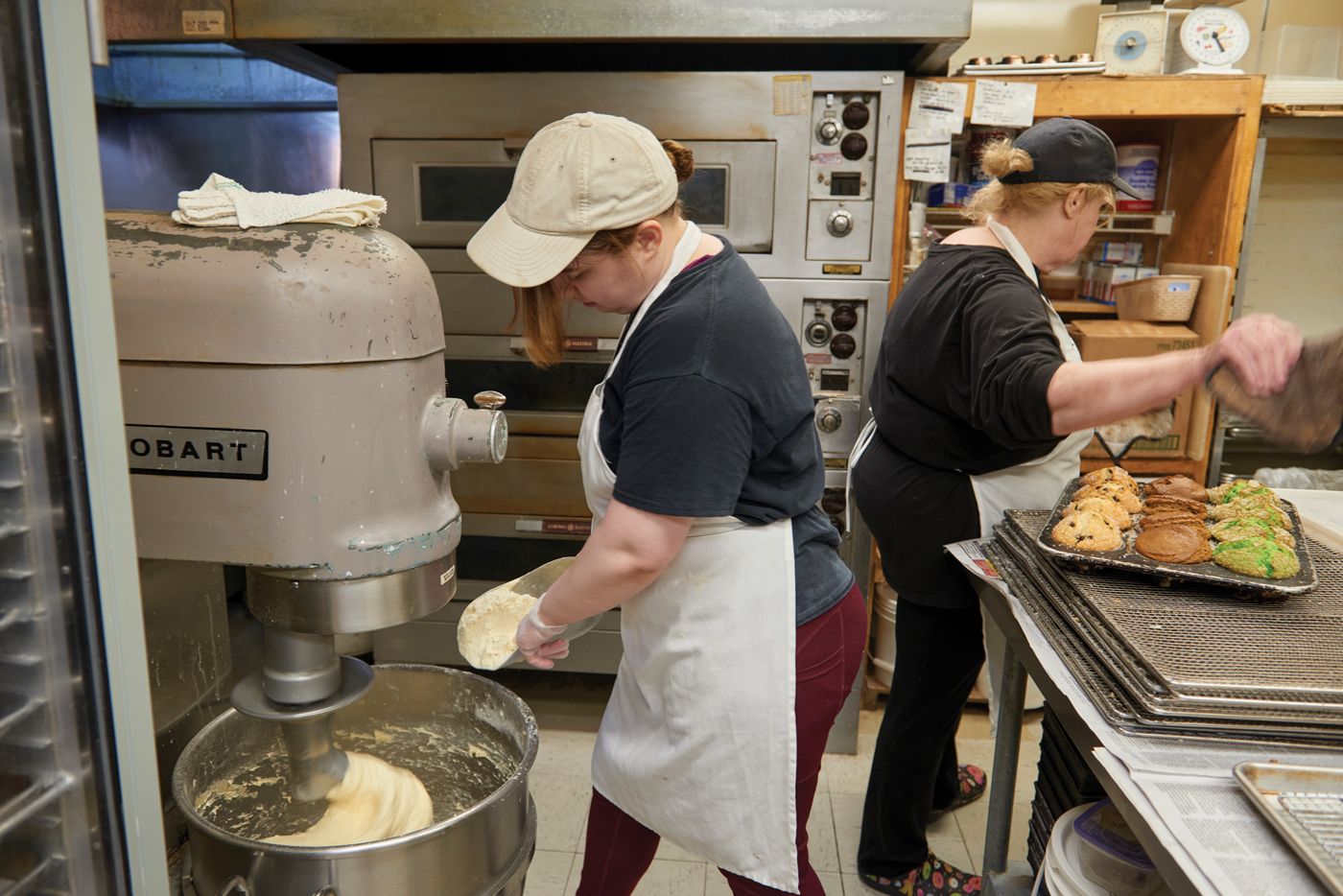
I arrived at Weiser’s Market in Akron precisely at midnight, hoping the bakers inside would hear me at the door. Akron was quiet, the market almost completely dark, save for the warm glow of light emanating from the small bakery inside. Denise Daughetee, a kind-hearted baker who already had a two-hour head start, greeted me at the door. She and manager Heather Harsh had already prepared the first of two 20-pound batches of yeast-risen dough made from scratch. One pound of dough yields approximately a dozen donuts, so tonight’s queue is 40 dozen, along with many other baked goods to prepare. Their work includes preparing special orders for a dozen or more donuts, as well as standing orders (most for weekly customers such as churches and auctions). The process is carried out nightly, as in seven nights a week.
In the middle of the bakery stands an old Hobart mixer, sturdy with the look of machinery from an era of lasting quality. Mixing ingredients with a dough hook the size of my arm, Heather watches the mixer attentively, instinctively eyeballing the amount of water to add to the flour, mentioning “ingredients change, and humidity is a factor.”

Watching dough grab the edges of the metal bowl, she gently pushes in a fingertip-sized amount of flour every few seconds until the 20 pounds of dough forms a perfect sphere. Once risen, the dough is rolled and cut before it’s placed in a proofing cabinet (set to around 110 degrees), until it’s ready for the fryer. When they emerge from the fryer, many donuts are glazed or powdered and then filled by hand. The cream filling, by the way, is pure perfection.
Listening to mystery podcasts and music in the otherwise dark and empty market, Heather and Denise always have something to do. They’re short-handed, which requires them to work extended shifts, but you’d never know it from their upbeat attitudes.
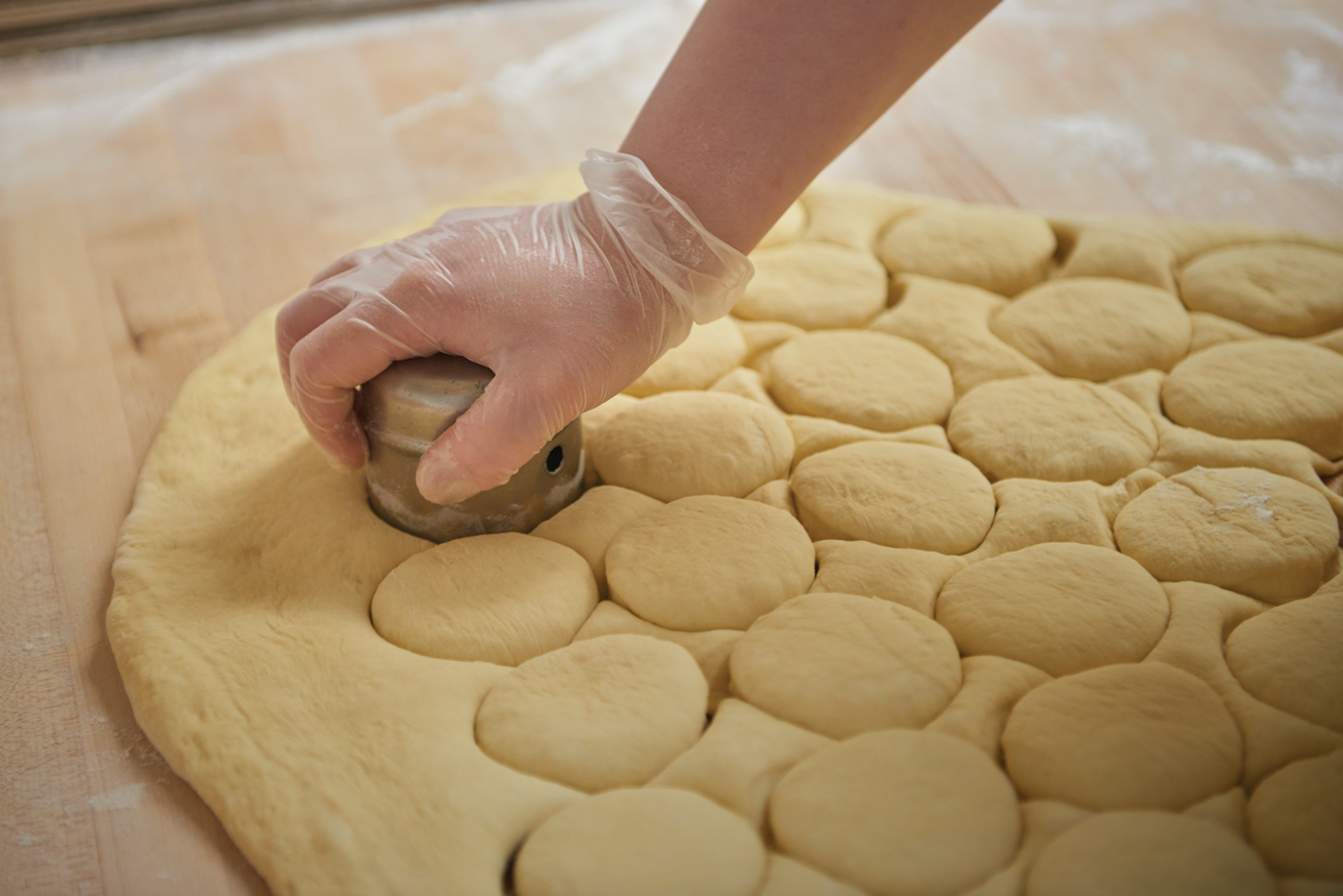
There’s a rhythm and dance to the overnight operation: one tray of dough comes out of the proofing cabinet and into the 375-degree fryer oil (changed every Sunday), as another tray of donuts cools enough to glaze or pipe icing. Slowly, as the night turns into morning, their progress is marked by empty bakery racks that are beginning to fill.
Weiser’s Market opens at 7 a.m. and the donut case is commonly depleted within hours. Early risers get the donuts. Fortunately, on this day I was among them – I was treated to a glazed, unfilled donut hot out of the fryer. Every morsel melted in my mouth; the aroma itself is good enough to eat.
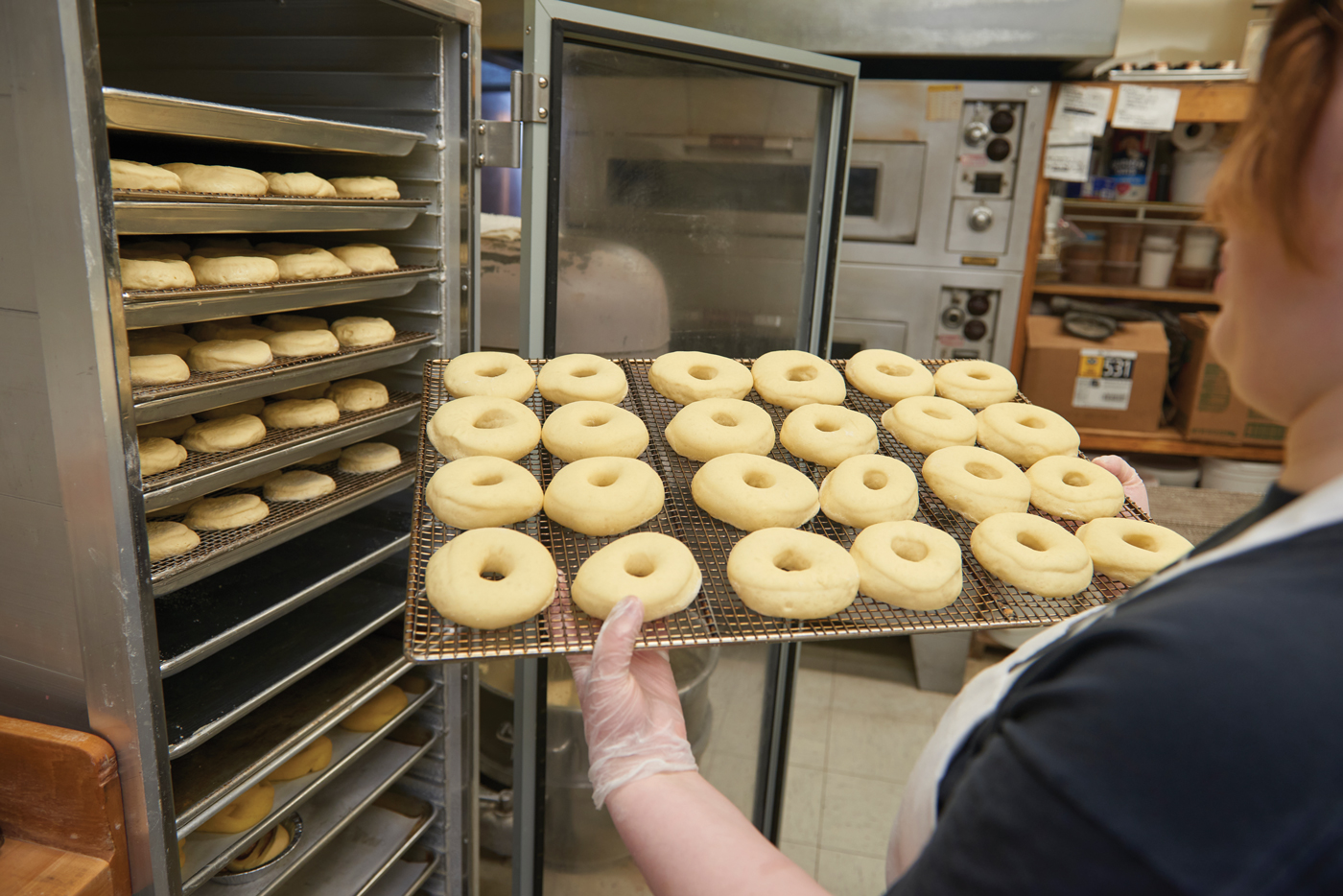
Satisfied with seeing what goes into making a Weiser’s donut, I departed the bakery around 5 a.m., with Heather and Denise moving on to other baked goods. Waiting for a disposal truck to leave so I could move my car out of the parking lot, the birds were singing their morning song and the deep blue hue of the sky was starting to climb from the east.
At home, I reheated a glazed donut in a convection toaster oven. The resulting bliss was made better still by a hot cup of coffee. A cold glass of whole milk would do it equal justice.
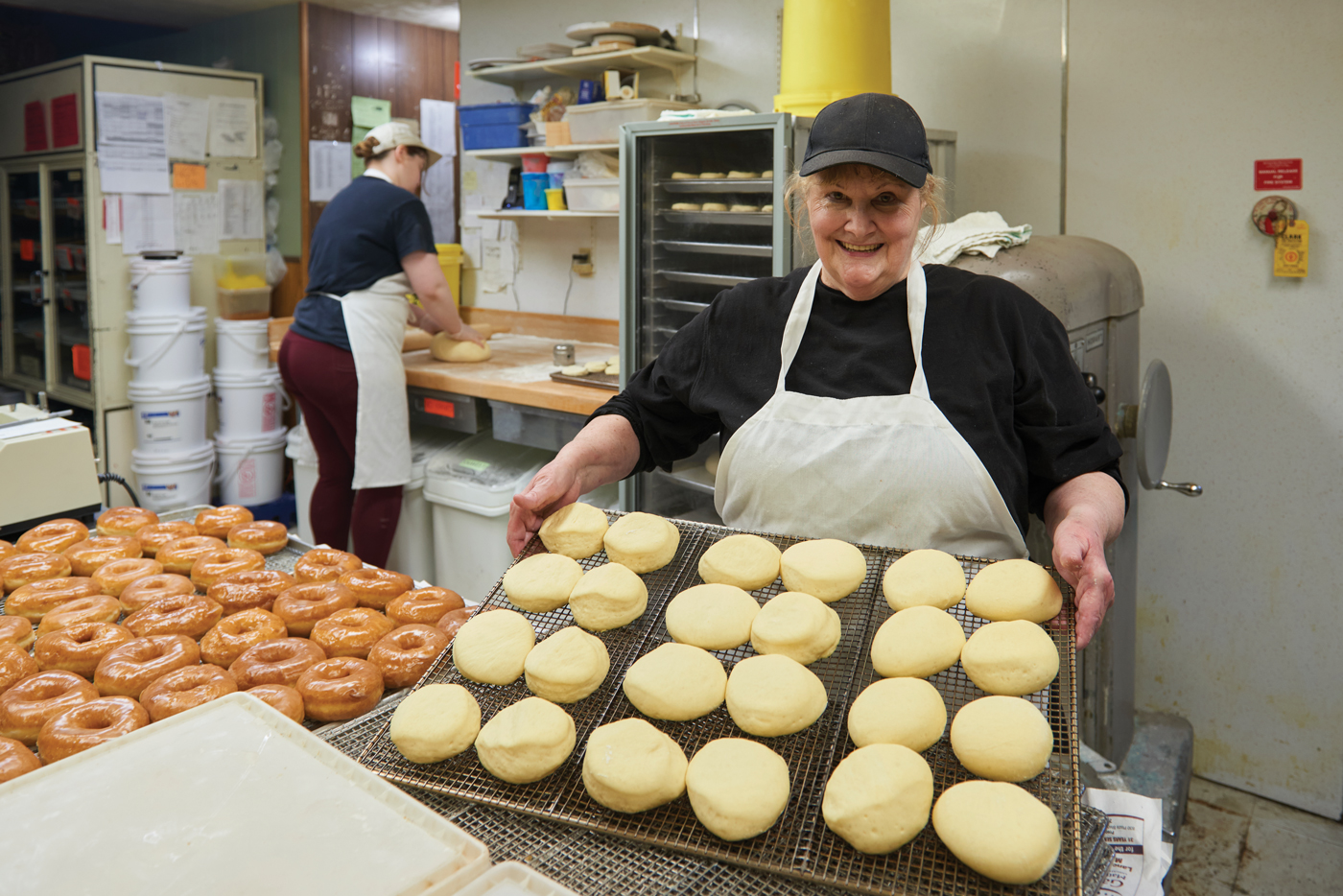
I studied what used to be a Weiser’s cream-filled donut, now with glaze added. It’s an offering they will not make, even as part of custom orders. There are signs about the bakery declaring so. Much of the reason has to do with the time it takes for donuts to cool before glazing, and then again for filling.
There’s also another, more-important reason. To indulge my curiosity and to prove that point, Heather had filled a single glazed donut for me. Born with a mouth filled with many a sweet tooth, I could only get past a bite. It was painfully, sickeningly sweet. The experimental donut proved that perfection comes in the form of a Weiser’s powdered and cream-filled donut; nothing beyond it should or does exist.
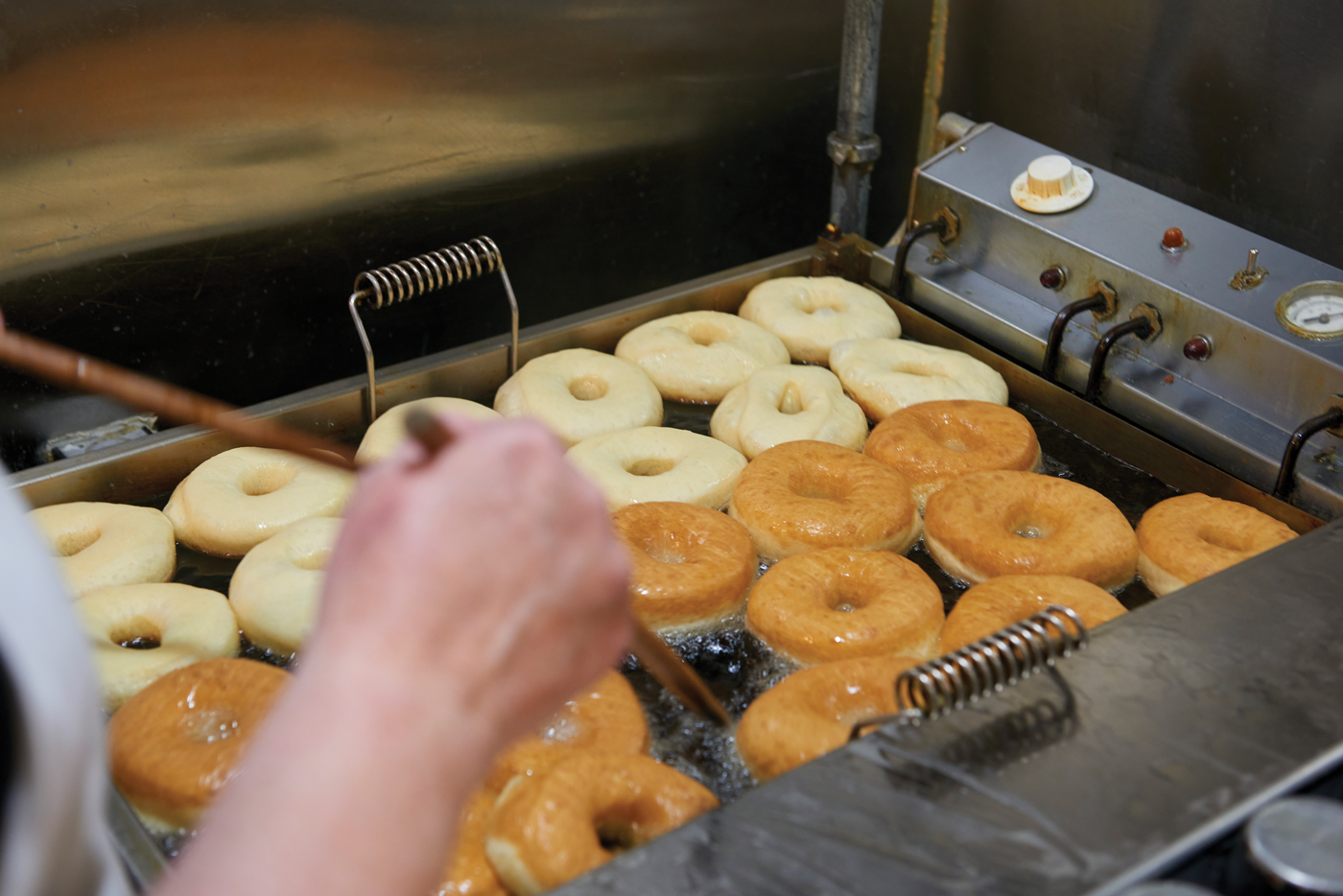
A Familial Community
I had more questions about the origins of Weiser’s Market and the surrounding community in which I now live. That led me to meet with founder Tim Weiser and his daughter, Laura Kauffman.
Tim launched Weiser’s Market in Akron in 1998, after moving from the Harrisburg area. Four years later, he added a second location in Lititz. “Our people take pride in what they’re doing. They live here in town and serve the townspeople. You don’t want to disappoint your friends and neighbors,” says Tim of his employees’ dedication. “The sense of community and being a family-oriented place has always been a priority,” says Laura. “I don’t think that will change.”
Tim cheerfully recalls a young neighbor from a nearby family of regulars who once ran over for milk and without asking for permission or understanding that it needed to be paid for, he left. “The kid came over, grabbed the milk and went home,” says Tim. “His confused mother exclaimed, ‘Where did you get the milk?’ to which he replied, ‘Over at Weiser’s.’ His embarrassed mother said, ‘You can’t just take the milk!’ It was so funny!”
The Original Home Delivery
Covid, of course, prompted stores and restaurants alike to offer delivery options to their customers. For Weiser’s, however, it was business as usual, offering it as a service to customers residing in senior living communities or unable to leave their homes. “Today, people view home delivery as the greatest thing since sliced bread,” says Tim. “We’ve been doing it for over 20 years.” He traces the start of home delivery to a regular customer who approached him with a request. “I’m going in for surgery next week, I’m not allowed to drive, will you deliver groceries to us?” he recalls of the conversation. “I said, ‘Absolutely,’ and it grew from there.”
Both the Akron and Lititz stores make roughly 30 deliveries each week, with those in Akron made personally by Tim and his wife by van every Wednesday. Tuesday is delivery day in Lititz. It’s a service they’ve never advertised but as their longtime customers aged into retirement communities, the service allowed them to take Weiser’s with them – including small, personal-sized orders for donuts.
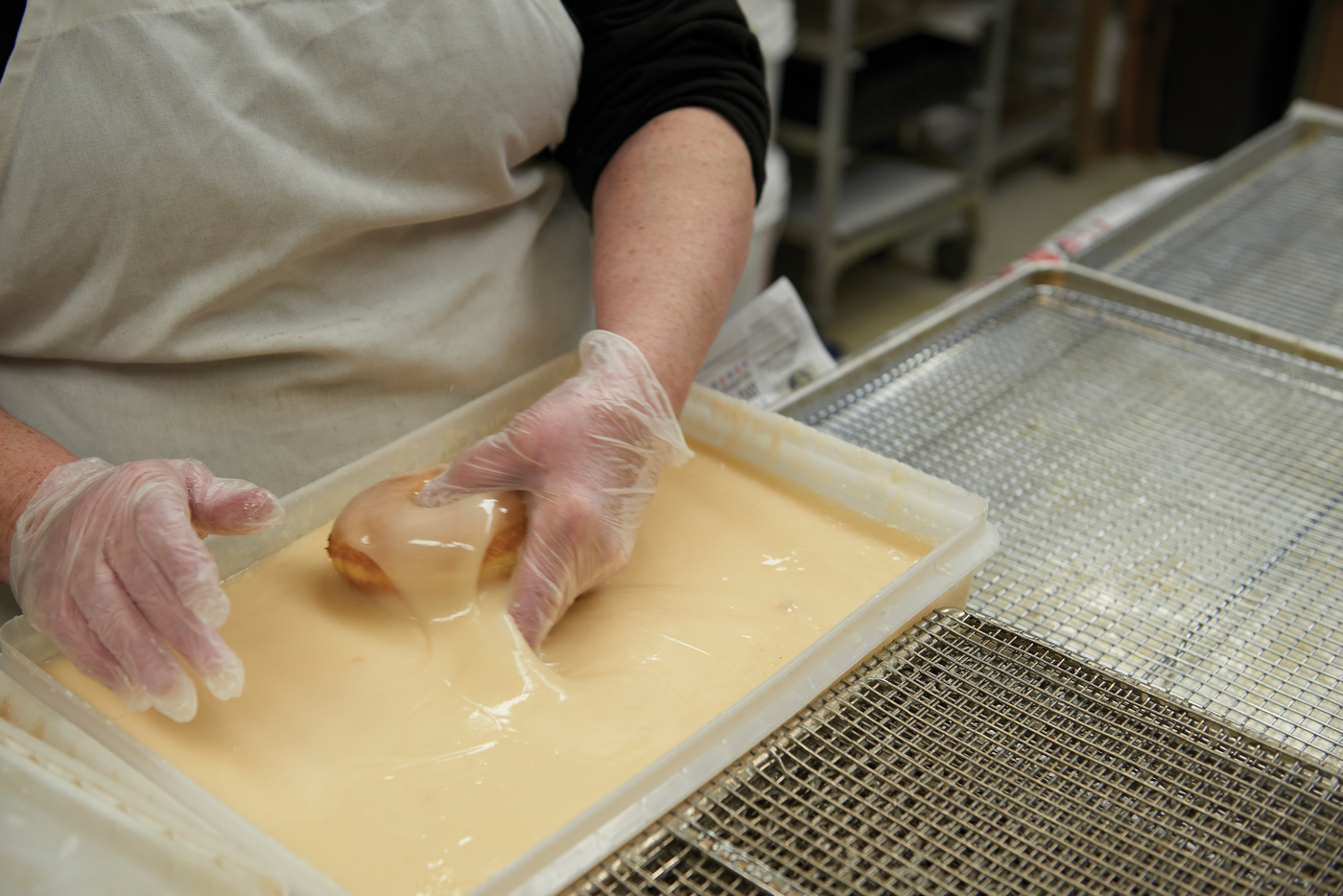
“They took care of us, now we take care of them,” says Laura of the service. “The people we deliver to have shopped with us for years, so it’s only right that we help them because they help us. We even deliver to those who weren’t regular customers – you can’t take advantage of someone because they can’t drive or don’t have the means to come to the store.”
Obviously, customers old and new can’t resist the allure of Weiser’s donuts. “When they call in their orders, many will say, ‘I’d like two cream-filled donuts.’ They can still experience a Weiser’s donut even if they can’t get here,” Laura continues. “We’ll gladly help them out.” Laura and several other employees “shop” all the orders. “Some of the people who call us don’t see very well and aren’t able to go on a computer to order online,” she explains. “Some don’t have access or the [technical] understanding, but they can call [with their order]. We pull out our paper and pencil and take their order.”
Weiser’s pre-made meals are made from scratch and are essentially home-cooked meals ready to go at a moment’s notice. I love their mesquite rotisserie chicken and loaded baked potatoes. Occasionally they have a macaroni-and-cheese infused with hearty bits of ham available that’s delicious. “Our meal solutions – subs, sandwiches and hot foods – are made in-house,” Tim notes. “Our hot foods table items are made from scratch and are not frozen.”
Covid did bring one change to Weiser’s. “Before Covid hit, we’d have lunch on the porch between 10-2 on Saturdays,” Tim explains. “I enjoyed seeing people from the neighborhood come in and talking with a neighbor for 15 minutes. That’s what a family-owned community store is all about.”
Laura was 15 when her family bought the market, so she remembers what life was like before and since. Laura and her husband’s three sons, who range in age from 5 to 9, are beginning to take an interest in the market. She recalls a lesson learned years ago when a large grocer “was running an advertising campaign about how much they donate to the community. It kind of made me upset because, obviously, they can donate a lot more than we can, but we try to do our share and be a part of the community. I commented to [Dad], ‘We should tell people what we do.’ I will never forget that – he looked me straight in the eye and said, ‘We do things because they’re the right thing to do.’”
Committed to Family and Community
In talking with Tim and Laura it becomes evident that a fine line exists between family and employees. When they say employees are like family, they mean it. “We have had employees who I remember when they were born,” says Laura. “Their moms would bring them to the store in a stroller and when they turned 16, they’d apply for a job.”
Tim adds: “We’ve had grandparents, parents and kids working for us.” Laura elaborates, saying, “We’ve had a lot of siblings – when someone leaves for college, they’ll have a younger brother or sister who will work for us.”
Then there are the long-time employees. “Theresa Ackley, she’s been here 43 years – even before we bought it. She started here when she was 15,” Tim explains. “She worked for the previous owner for 20 years, and she worked for us for 23 years. She knows everyone and everyone knows Theresa.
“We have a few others who have been with us for all 23 years,” he says of Deb Melcher, Amy Wiegand and Pamela Hayden. “Our deli manager’s mother worked for us,” Tim says of Katie Witwer and her mother, Terri Witwer. “When Katie was little, she would come to work for an hour or so with her mom, Terri. When Katie turned 16, she started working for us. Now, she’s our deli manager and a college graduate. Terri is our bookkeeper; she still comes in once a month to do our quarterly bank reconciliations. We’ve become family.”
When asked where they hope to see Weiser’s in the coming years, Tim and Laura’s answers are simple, profound and in sync: to remain a family-owned business committed to the community. Their goal is not without challenges. Not only are family-owned, neighborhood grocery stores becoming fewer in number, but the number of small, local bakeries that roll out yeast-risen dough by hand are fewer still.
An even less-expected service is the role Weiser’s often plays in the community as a hub for information. “I like when people come in and ask us what’s going on in the community,” says Tim. “They’ll come to us with questions like, ‘How do you rent the pavilions down in the park?’ They ask us instead of going to the borough. Because we’ve been here for 23 years, we can send people in the right direction,” he explains.
“I’m getting older, I’m getting tired, so the hope is to turn it over to Laura someday,” Tim shares. Without hesitation, Tim repeatedly emphasizes that growing the market is his dream but he also acknowledges that it will fall to his children and their families to decide if they want to follow that path or pursue another. Ultimately, he wants them to be happy, healthy and do whatever they choose.
With a warm smile, Tim admits that when any of his six grandchildren visit him and his wife at home, they’re going to “Maw’s,” but when they come to the market, they’re at “Paw’s.”
“I enjoy the business, I enjoy the community,” says Tim. “Thank you, Akron; I’m glad I met you.”
Glazed, powdered, cream-filled and Boston cream-filled donuts can be purchased at either location. Orders for a dozen or more donuts must be placed a day or more in advance.
Weiser’s Market Akron, 805 Main Street, 717-859-2765
Weiser’s Market Lititz, 680 Furnace Hills Road, 717-626-0271
Weisersmarket.com
Donut Trivia
1. Doughnut or donut? Since the 1950s, it’s become common – and accepted – to spell it as donut.
2. In ancient Greece and Rome, donut-like treats were “glazed” with honey or fish sauce.
3. Where does the “nut” reference come from? Early bakers inserted nuts into the middle of balls of dough.
4. As for the hole in donuts, credit for that goes to 19th-century sea captain, Hanson Gregory, whose mother sent him off with donuts to sustain him through his voyages when he started as a crewman. He noticed the dough in the middle of the donuts was always nearly raw and asked a tinsmith to make him a device that would create holes in the center. He shared it with his mother and the rest is history.
5. National Donut Day is celebrated on the first Friday in June.
6. Washington Irving is credited for being the first writer to mention donuts. In A History of New York (1809), he made mention of “balls of sweetened dough, fried in hog’s fat and called doughnuts or olykoeks.” Irving’s reference made sense: the Dutch made a donut-like treat they called “olykoeks” or “oily cakes.”
7. One legendary donut shop – Voodoo Doughnuts, based in Portland, Oregon – took pride in the crazy concoctions they devised. A line of medicinal donuts – glazed/topped with NyQuil, Pepto Bismol or Tums – attracted the attention of the FDA, which put an end to the donut flavors.
8. There is some validity to the cops-and-donuts connection. Prior to the 1960s, policemen working graveyard shifts had few options for taking a break. Only diners and coffee shops stayed open late at night. As a result, cops developed coffee-and-a-donut eating habits. The proprietors loved to see them stop by since a policeman on the premises provided a sense of security late at night.
9. Donuts fueled the troops during both World War I and II. The female volunteers who distributed donuts (even to troops in the trenches of France) were called Doughnut Lassies (WWI) and Doughnut Dollies (WWII).
10. Donuts also helped people endure the Great Depression and as a result, were designated as the “Hot Food of the Century of Progress” during the 1933 Chicago World’s Fair.



